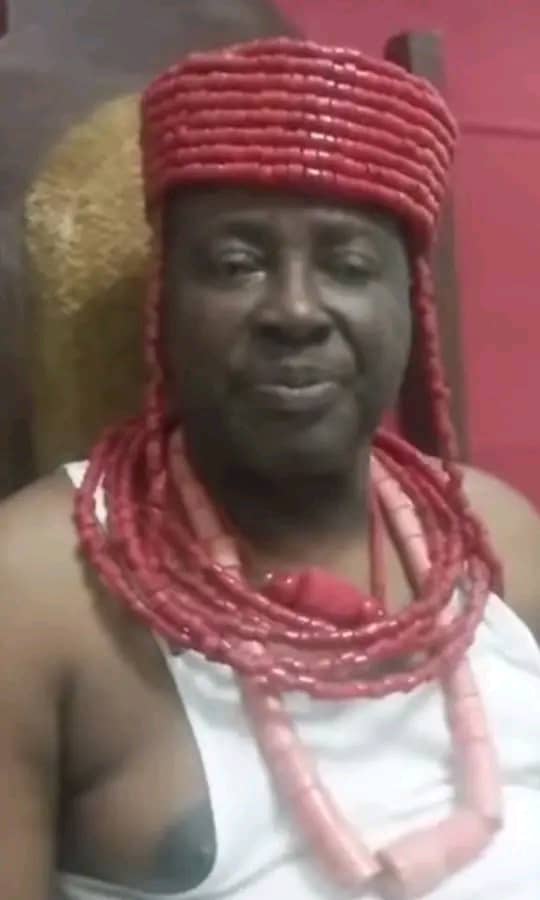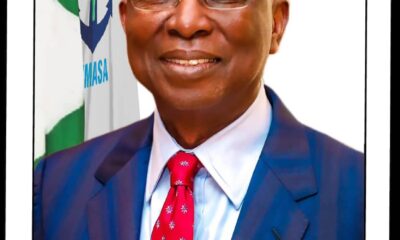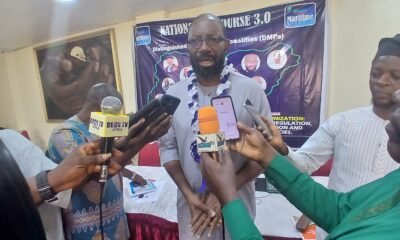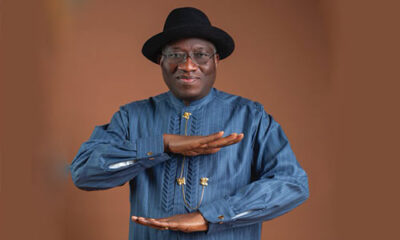Politics
Osawota: Contender Or Pretender To Orogun Kingship Throne?

BY EGUONO ODJEGBA
The tranquil Orogun Kingdom in Delta State, Nigeria, was recently jolted by a storm of controversy following Chief Andy Kayoma Osawota’s self-declaration as “Adaka I, the Ovie of Orogun Kingdom.”
This unilateral move, captured in a viral video, ignited widespread condemnation from all corners of the community—women, youths, elders, intellectuals, and titled chiefs—who united, denounced the act and declare Osawota an enemy of the kingdom.
Those who knows A.K Osawota says his rise to limelight is carved between pages of disturbing history — one believed to be driven by a combination of ambition and audacity to get his heart’s desire. Said to be very smart with a foreboding foresight, Osawota opted to chase his dream vide politics, a strategic focus that saw him getting appointed as the Chairman of Delta State Oil Producing Areas Development Commission (DESOPADEC).
Also believed to be coldly calculating, the rest, analysts say has been a walk over, including his alleged long haul plot to seize his native home town’s crown, which he reportedly achieved by running roughshod over the system, via unremitting political maneuvering, in addition to utilizing his high heel political connections such as was the case in achieving his DESOPADEC leadership dream.
Community leaders and close observers argue that his wealth emboldened him to orchestrate a long-standing scheme aimed at installing himself as king, bypassing tradition and customary legal processes. At the height of his orchestrations, a section of the custodians of Orogun heritage went to court where the High Court judgment in Suit No. UHC/98/2024) explicitly barred any individual from assuming or conferring the title of Ovie without due process.
Osawota’s actions were deemed a direct violation of this ruling. Chief E.T. Opone, President General of Orogun Kingdom, publicly faulted the proclamation, citing the court’s decision and warning of the destabilizing consequences.
Those opposed to his seizing of Orogun’s kingship say he imagined he could gain a foothold that will swing him into authority and legitimacy by trampling on the law in the belief that Nigeria is a banana republic.
The Igbuku Community, a key segment of Orogun, issued a scathing press release condemning Osawota’s “unlawful and provocative” actions. Leaders such as Augustine Onojedo and Chief Hon. Chucks Erhire emphasized that the move threatened the peace and unity of the kingdom. Their collective voice reflected the broader sentiment of betrayal and alarm felt across the region.
However, sources close to Osawota suggest that his ambition was not spontaneous but the culmination of years of strategic positioning. His tenure at DESOPADEC allegedly provided both the financial leverage and political connections to mount a covert campaign for the throne.
While critics argue that his actions reflect a troubling blend of entitlement, opportunism, and disregard for tradition, supporters urge caution and argued that Osawota has been an invaluable pillar in the development of the kingdom.
Some of those who have expressed disbelief at Osawota’s attempted papalce coup say he was no more than a struggling politician when he bagged his DESOPADEC job — and that he was at the time humble, and believed to have been quite responsive to the needs of the kingdom; unlike now that he allegedly weaponizes wealth as a means of achieving whatever he sets his heart on as a local champion; and where he reportedly holds sway as one of the richest.
Osawota’s rapid financial rise during his time as Secretary General raised suspicions. Community members and critics linked his newfound affluence to monies he made during his days at DESOPADEC.
This conflict has thrown up issues of numerous infrastructure and development projects that were left uncompleted during his tenure, leaving oil-producing communities underserved with contractors, and also stranded. Opponents allege that Osawota’s tenure coincided with the controversial legislative changes that restructured the commission’s leadership, a restructuring they further argued led to a concentration of power and reduced oversight, making it easier for internal actors to manipulate contracts.

Others say that his tenure at DESOPADEC led to a shift in outlook and orientation aimed at to upsetting his home town’s political structure with him as the centre of gravity—wielding power and authority.
Those whose business it is to know say Osawota has long been on the plot, and had at certain juncture in the past betrayed his plot, leading to a gradual but steady erosion of his reputation as a rising community star into an upstart and then, full blown rebellion in the recent attempt to claim the Orogun kingship title.
Ahead of his appointment with DESOPADEC, Osawota was actively involved in the Peoples Democratic Party (PDP). Then as the Managing Director of DESOPADEC, his tenure gave him access to political networks and influence within Delta State’s governance structure.
As a top official, he was involved in strategic decisions and resource allocations. In 2013, following the death of Senator Pius Ewherido, Osawota declared his intention to contest for the Delta Central Senatorial seat under the PDP banner.
There is speculation that with the failure of his senatorial ambition in 2013, his political relevance has suffered a steady decline, especially after President Bola Tinubu rejected lobby to make him head the newly South-South Development Commission. Analysts say the failure to secure the SSDC appointmentmay have forced him into a lone struggle to seek relevance at his place of birth; where the Orogun kingship stool, became the lone, attractive political ornament.
His latest attempt to claim the stool is seen by many as a continuation of his political maneuvering.
Osawota’s kingship declaration came amid heightened political tension and restructuring within Delta State’s traditional leadership framework. Some speculate that he may have exploited this moment to assert his claim.
Despite attempts to make Osawota’s self-proclamation as Ovie of Orogun Kingdom appear a solo act, there are strong indications that he may have received tacit encouragement from some quarters, including Chief (Dr.) Bennis E. Agbonifo, in spite of her strident protest, alleging character assassination among other things.
In the unfolding drama surrounding the Orogun kingship dispute, few figures have drawn as much scrutiny as Chief (Dr.) Bennis E. Agbonifo. Her recent open letter to Governor Sheriff Oborevwori, in which she decried alleged defamation and character assassination, has sparked renewed debate—not for its claims, but for what it omitted.
At the heart of the controversy is Madam Agbonifo’s perceived double role in the failed attempt by A.K. Osawota to usurp the traditional Orogun kingship. While she now positions herself as a victim of political vendetta, eyewitness accounts and video evidence suggest she was an active proponent of the so-called “modernisation” of the kingship institution—a move widely interpreted as a backdoor strategy to legitimize Osawota’s claim.
During a tense town hall meeting convened in the aftermath of the failed bid, Madam Agbonifo attempted to justify the controversial succession plan by referencing a purported book by Justice Ovie Omo-Agege. Her appeal to literary authority, however, failed to sway the audience. Instead, it ignited outrage among Orogun youths, who viewed her intervention as a betrayal of tradition and a thinly veiled endorsement of an illegitimate process.
The meeting ended in chaos, with Madam Agbonifo being denied further audience and escorted out by angry attendees. This incident stands in stark contrast to the tone of her letter to the governor, where she paints herself as a neutral party maligned by political actors. The contradiction between her public defense and her actions on the ground has led many to question her credibility and motives.
While it is essential to uphold the dignity of public figures and avoid ad hominem attacks, the facts surrounding Madam Agbonifo’s involvement in the kingship saga raise serious concerns. Her attempt to recast herself as a victim, despite documented efforts to promote a deeply divisive agenda, suggests a troubling disconnect between her narrative and reality.
TO BE CONTINUED TOMORROW





































